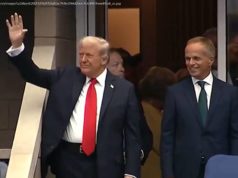The Latest on Russian doping (all times local):
LAUSANNE, Switzerland (AP) – The Latest on Russian doping (all times local):
___
10:40 p.m.
Russia’s top Olympic official apologized to the International Olympic Committee board for doping violations ahead of its ruling that Russian athletes must compete under a neutral flag in Pyeongchang.
“I as president of the Russian Olympic Committee, apologize for breaches of anti-doping rules which were committed in our country,” ROC president Alexander Zhukov said, according to a text of his speech on the Russian Olympic Committee website.
However, Zhukov, in his speech, rejected the evidence behind the central charge that Russia ran a doping system at the 2014 Winter Olympics in Sochi.
The speech describes the World Anti-Doping Agency’s key whistleblower, former Moscow and Sochi anti-doping lab director Grigory Rodchenkov, as “a fraudster” and an unreliable witness who was himself the main cause of any doping violations.
Zhukov also says in the speech that Russians competing under a neutral flag at the Olympics would “feel like outcasts.”
Zhukov struck a more conciliatory tone after the IOC ruling, saying he would discuss the issue of Russian participation with athletes, and praised the IOC for proposing the designation “Olympic Athlete from Russia” for Pyeongchang, rather than a totally neutral name.
___
10:10 p.m.
Ian Chesterman, chef de mission for Australia’s Olympic team at Pyeongchang, said the IOC’s decision was an “appropriate and considered response… punishing those involved in the blatant cheating, the systematic manipulation that took place during the 2014 Sochi Olympic Games while allowing clean athletes to compete in Pyeongchang.”
In an Australian Olympic statement Wednesday, Chesterman added: “The culprits, the corrupt, have been dealt with. Russia, and all involved with Sochi 2014, had a responsibility to nurture the Olympic Games and respect the athletes competing by providing a fair competition. Clearly, across so many levels, that trust was abused.”
___
9:50 p.m.
Former NHL player Ilya Kovalchuk says Russia must go to the Olympics despite not being able to use its national flag at the Pyeongchang Games.
Kovalchuk tells Russian news agencies that a boycott would not work. He says “refusing means giving in” to what he terms political pressure.
The IOC has ruled that any Russian gold medalists will have the Olympic anthem, not the Russian anthem, played on the podium. Kovalchuk says Russian players will sing their anthem if they can win a medal.
Kovalchuk adds that “patriotism and love for your country, it’s in your heart. For that you don’t have to shout or even wear the flag on your chest. And if, I hope to God, we manage to compete well, then we’ll definitely sing the anthem.”
Kovalchuk was named to Russia’s pre-Olympic hockey team on Tuesday.
___
9:35 p.m.
The spokesperson for the Russian foreign ministry says the IOC ruling is “painful.”
Maria Zakharova writes on Facebook: “Is it painful? Very…. Will we survive? Yes.”
Zakharova adds that the 2014 Sochi Games showed that “Russia hosted a truly excellent Olympics.”
The IOC ruled there was a doping conspiracy at the Sochi Olympics.
___
9:25 p.m.
The IOC is seeking to wipe away much of Russia’s tainted Sochi operation from future Olympics.
Sochi organizing committee CEO Dmitry Chernyshenko has lost his place on the IOC panel overseeing preparations for the 2022 Beijing Olympics.
Chernyshenko was a familiar smiling face at the Sochi Games, which Russia spent $51 billion to organize and stage, and now leads the Kontinental Hockey League.
In a swathe of punishments for the Sochi doping program, the IOC also ruled that “no member of the leadership of the Russian Olympic Team” in Sochi can be invited to the Pyeongchang Olympics.
Coaches and medical doctors whose athletes have been guilty of a doping violation will also be barred from accreditation in South Korea.
___
9:10 p.m.
The honorary president of the Russian Olympic committee says the country’s sportsmen and sportswomen should compete at the Pyeongchang Games as neutral athletes rather than boycott.
Leonid Tyagachev tells Russian state TV that “there’s a ruling, but just allow young athletes who didn’t compete at the Olympics in Sochi, let them compete clean and show that we’re from Russia and we’re not pariahs.”
Russian TV news has typically portrayed allegations of a doping system as unjust, and cited comments from viewers condemning the ruling.
Broadcasts on Russia’s main rolling news channel showed graphics including the Olympic rings crossed out with a red line and the phrase #noRUSSIAnoGAMES.
___
9 p.m.
The president of the Russian Olympic committee says the country’s athletes need time to consider whether they will take part in the Pyeongchang Games.
Alexander Zhukov says “we plan for it to be discussed” by Russian sports officials and athletes at a forthcoming meeting before a final decision on participation, but didn’t give a date.
Zhukov paints the ruling as a compromise, saying “there’s positive and negative sides,” and praising the International Olympic Committee decision to use the term “Olympic Athlete from Russia” for Russian competitors under a neutral flag.
Previously, suspended countries have used terms such as “Independent Olympic Athlete,” which was used last year for Kuwaiti competitors at the Olympics in Rio de Janeiro.
Zhukov says “they’ll be called Russian athletes and not some kind of neutrals… that’s very important.”
Two-time reigning world champion figure skater Evgenia Medvedeva, who also appeared in front of the IOC board, won’t say if she’ll compete as a neutral.
Medvedeva says “it will be discussed more and it’s very early to ask questions like that.”
___
8:30 p.m.
Olympic bronze medalist Matt Antoine was wrong, and was thrilled.
The American has been very outspoken in his criticism of how the IOC and the World Anti-Doping Agency has handled sanctioning Russia and its athletes for their roles in the state-sponsored doping scandal at the 2014 Sochi Games.
He says he was “truly in shock” when he heard the IOC ruling that will bar Russia from Pyeongchang and allow clean Russian athletes to compete under the Olympic flag.
“It is without a doubt the correct decision and the only option that allows for athletes, nations, and fans to continue to believe in the Olympic movement,” Antoine said.
Antoine says the decision was bold, and that athletes are celebrating the IOC’s stance.
“Dedicated athletes around the world thank you,” Antoine said.
___
8:20 p.m.
The International Olympic Committee has ruled the Kremlin was not responsible for widespread doping by Russian athletes at the 2014 Sochi Games.
An IOC disciplinary commission under Samuel Schmid “has not found any documented, independent and impartial evidence confirming the support or the knowledge of this system by the highest state authority.”
However, the IOC has banned Vitaly Mutko and Yuri Nagornykh, who were Russia’s minister and deputy minister of sport at the time of the Sochi Olympics, from attending any future games.
Schmid’s commission does not specifically accuse either of wrongdoing, but says Mutko must “bear the major part of the administrative responsibility” because the ministry was tasked with overseeing anti-doping operations at the Sochi Olympics.






